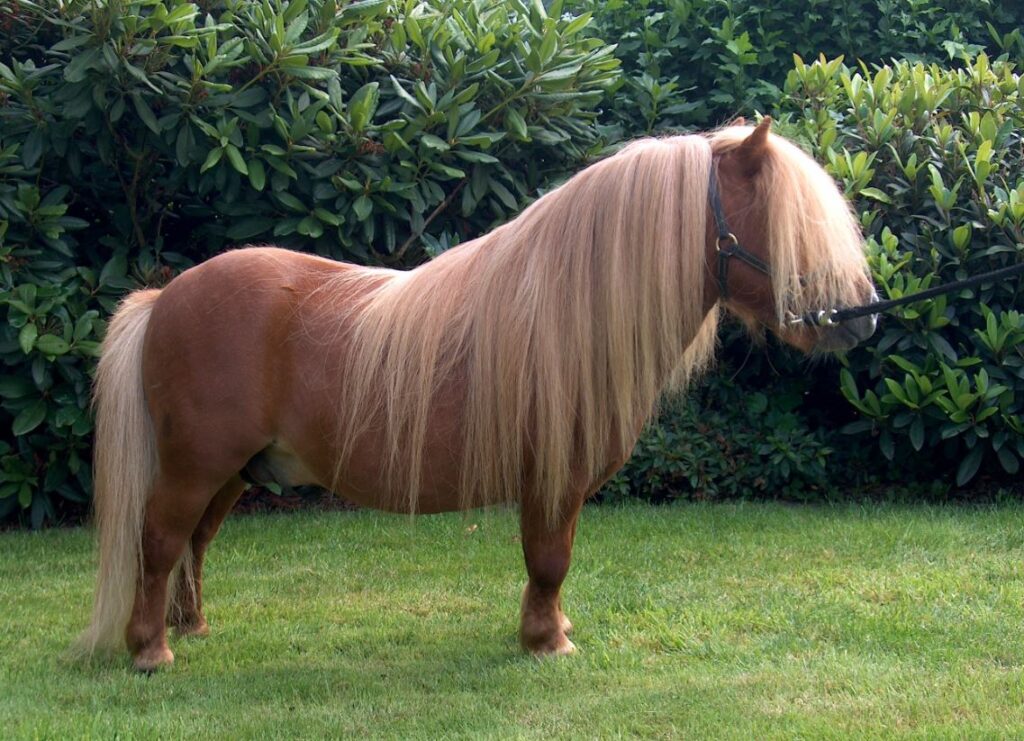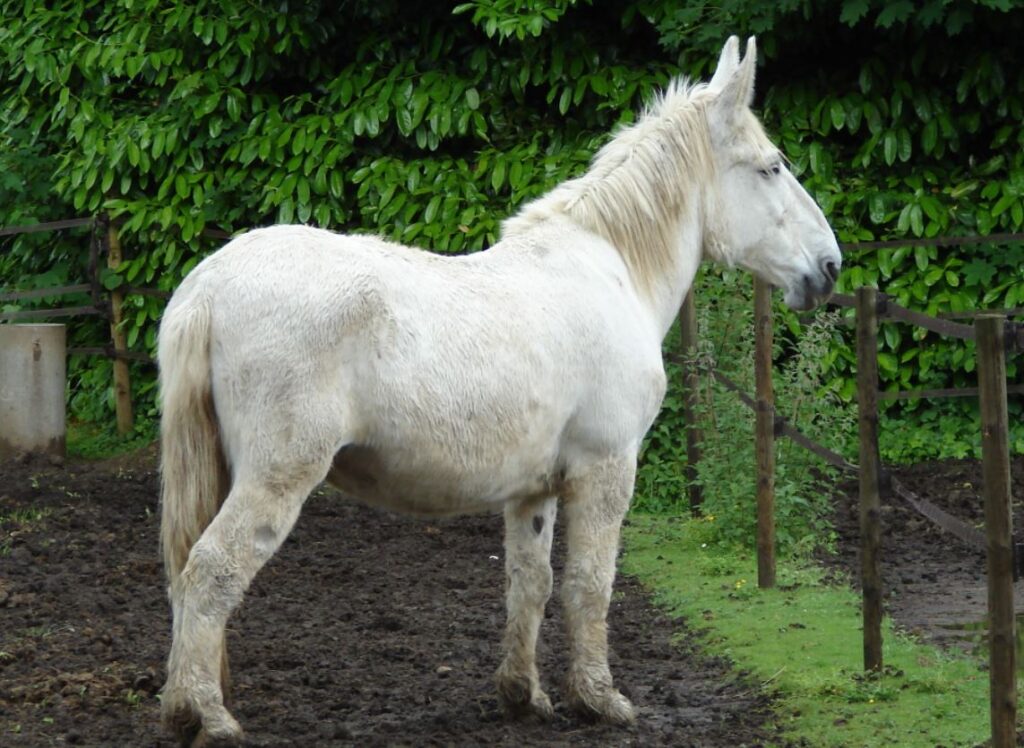Mule and pony are two different animals that are mostly mistakenly considered the same by many people. Although pony and mule both belong to the same genus, which is “Equine”, and are very closely related, the two animals are different.
This article will look at some of the most noticeable differences between these two animals to make distinction easy.
So, let’s get started.
Differences Between Mules and Ponies
A pony is just a smaller breed of a horse, while a mule is a hybrid offspring of a male donkey and a female horse. All significant differences between mule and pony are discussed below:
Appearance: Although mules and ponies look very similar, there are few differences in their appearance, like ears.
Feet and Shoes: Unlike ponies, mules do not require shoes because of their rough feet.
Fertility: The mules are generally infertile, and they cannot reproduce as opposed to ponies which are fertile and can have offspring.
Food: Both ponies and mules are herbivorous and feed themselves on plants, but ponies need salt in their diet, which is why they eat grass and hay more to fulfill their requirement of salt.
Strength: Mules are considered to be stronger than ponies because of their mixed breed. They inherit the qualities of both horse and a donkey.
Lifespan: The life span of mules is much longer than that of ponies, and they can live for almost twice as long as ponies do if they are looked after well.
Intelligence: Mules are more intelligent than ponies.
Skin Sensitivity: Mules are comparatively less sensitive to the sun and more tolerant to rain than ponies.
1. How Do Mules and Horses Look Like?
Both pony and mule look different in various ways. Mules have long ears as compared to ponies. The mules can have as long ears as 33 inches. Apart from the size of the ears, the overall sizes of ponies and mules also significantly. The standard size of a pony is 58 inches, while on the other hand, the size of a mule varies from 36-48 inches. Moreover, the feet of mules are smaller than that of ponies of the same age.

2. Mules Have Better Footing Than Ponies Do
Mules are considered better footed than a pony, a trait inherited from their donkey father. The feet of mules are usually tough and rough, so they do not require shoes instead of ponies that normally require better stability on the ground.
3. What Do Mules and Ponies Eat?
Both mules and Ponies rely on fruits and plants for their diet. However, there is a slight difference in their diets. Since ponies require extra salt for themselves, they feed themselves more on the hay, which is naturally rich in salt. Another difference in the diet of mules and ponies is that, just like donkeys, mules require less food than a pony of similar size.
4. Mules Cannot Have Babies While Ponies Can
Since Mules are a hybrid breed and their parents are two different species. Therefore they are always infertile. The mules cannot produce eggs because the sets of chromosomes they get from their mother and father are not matched with each other, or in simpler words, the chromosome sets they inherit are not similar to each other. While on the other hand, both the parents of ponies are also ponies; therefore, they do not have any infertility issues.
5. Who is Stronger, A Mule or a Pony?
Mules weigh more than ponies. The average weight of mules ranges from 370-460kg, while on the other hand, the average weight of ponies ranges from 180-370kg. Mules have more stamina and endurance than a pony of the same size, making them stronger and harder. Mules are generally stronger than ponies primarily because they have qualities of both parents, i.e., horse and donkey.
6. How Long Do Ponies and Mules Live?
Ponies have a shorter lifespan than mules. The average lifetime of ponies varies between 25-30 years, while on the other hand, the average lifespan of mules ranges from 35-40 years. However, mules can live for as long as 50 years which is almost double the average lifespan of a pony.
7. Mules Are Smarter Than Ponies
Mules are smarter and more intelligent than ponies. Mules have a good memory, and they mostly remember events, allowing them to take appropriate actions to avoid any bad experiences they have had in the past from happening again. Additionally, mules take well care of themselves when it comes to their health. They are smart enough to slow their pace or stop altogether if they feel overworked and need rest.
8. Mules Are Preferable for Harsh Environment As Compared to Ponies
Mules are preferred over ponies or horses by owners who tend to work in harsh weather and extreme sunlight because mules are less sensitive to sunlight and can easily tolerate harsh weather conditions and extreme rainfall. In addition, mules are resistant to skin irritations instead of ponies that tend to develop skin irritations from sun and rain easily.
Questions and Answers
Question: Can mules mate with ponies?
Answer: No, mules cannot mate either with ponies or with mules, primarily because all mules are sterile. Mules cannot have offspring of their own as they cannot produce eggs. Their horse mother has 64 chromosomes while their donkey father has 62 chromosomes, but a mule ends up with only 63 chromosomes which is an odd number, thus making it infertile.
Question: Do mules always have a male donkey father and a female horse mother, or can they have a female donkey mother and a male horse father?
Answer: Although the word mule is typically used for any hybrid of equine species, a mule is the offspring of a male donkey and a female horse, while a male horse and a female donkey are called a female donkey hinny.
Question: Is pony a baby horse?
Answer: Most people confuse ponies with horse babies. A pony is not a baby of a horse; in fact, the pony is different from that of a horse. A pony remains smaller as compared to a horse, even after it grows older.
Question: I have heard mules take care of themselves better than ponies do, is it true?
Answer: Yes, mules indeed take care of themselves better than ponies do. Mules have a powerful sense of self-preservation which is why they are less vulnerable to injuries than ponies. Moreover, mules are very well aware of their surroundings, allowing them to survive dangerous situations better.
Question: Which is more durable, a pony or a mule?
Answer: A mule is much more durable than a pony for many reasons, such as mules are healthier; they require less food to acquire energy, and most importantly, they have strong stamina than a pony.
Question: Which is better for a ride, a mule or a pony?
Answer: A mule is indeed better for riding. Mules examine the trail first when descending mountains and slopes, looking for the most reliable path, which adds an extra comfort level for the rider. Additionally, mules have stronger upright feet, strong legs, and narrow bodies, all of which allow mules to retain stability even on uneven ground.
Question: It is known that ponies are easy to train, so why are mules considered more intelligent than ponies?
Answer: Ponies are indeed easy to train, but they do not take any initiative on their own to learn something, whereas mules are inherently intelligent, and they learn by themselves just by observing things. This is why mules are considered more intelligent than ponies, even though they are hard to train.
Question: Does a mule protect its rider better than a pony does?
Answer: Yes, a mule not only protects itself but is also very good at protecting its rider. Mules have inherited self-preservation instinct from their donkey father genes, which is why they can easily sense danger or threat. A mule protects itself and its rider by kicking and biting whenever it senses there is a danger.
Question: Are mules considered better for transporting goods or ponies?
Answer: Mules are considered better for transporting goods, especially to areas that are not otherwise accessible. Mules can carry substantial weight even for a longer route. Mules can carry almost thirty percent of their body weight while on the other hand, ponies can only carry twenty percent of their body weight, which is why mules are a better choice for transportation of goods.
Question: Are mules more responsive to the rider than ponies?
Answer: No, ponies are more responsive to their riders as compared to mules. It is easy to coax a horse even if he does not want to go in a particular direction, while a muse might refuse to follow a particular trail.
Although similar in stature and appearance, mules and ponies are two different animals. Knowing their differences will help us better understand their purpose and use them accordingly. We hope you found this guide helpful and can now differentiate between a mule and a pony.

